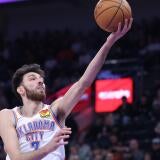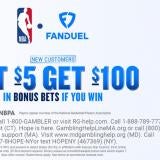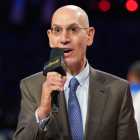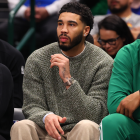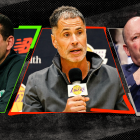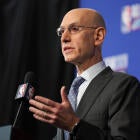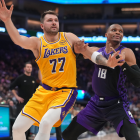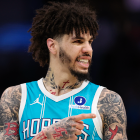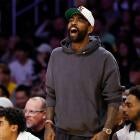Butler, George, Kyrie deals proving there's not always a 'loser' in every NBA trade
In fact, Stan Van Gundy believes the majority of NBA trades fall into the win-win category
Any time a trade takes place in the NBA these days, within 30 minutes you'll find 10 variations of a "winners and losers" column circulating the web -- which would imply that there is, in fact, a loser in every swap. Detroit Pistons coach Stan Van Gundy would disagree.
"Probably the majority of NBA trades end up [working out well for both sides]," Van Gundy said last week in Miami when I asked him about the offseason deal that brought Avery Bradley to the Pistons from Boston in exchange for Marcus Morris. "Certainly Marcus has helped [Boston], and Avery has certainly helped us."
Indeed, as teams begin crossing the halfway point of their seasons, the Bradley-Morris swap does appear to have checked both Boston's and Detroit's pre-trade boxes. Bradley is averaging over 15 points a game in Detroit, and he's continued to progress as a shooter, particularly from deep, at better than 40 percent from three. The Pistons rely on him heavily on both ends, and his presence also eliminated the dicey decision of whether to offer a long-term, high-priced contract to Kentavious Caldwell-Pope, who was set free to sign with the Lakers.
Morris, likewise, has been solid for the Celtics, who in addition to being stocked in the backcourt, needed to shed a little over $3 million in salary in order to sign Gordon Hayward under the cap. Bradley is making $3.8 million more than Morris this year, so the deal worked perfectly on the books and on the court, where Morris is averaging over 11 points and five boards while giving Boston some nice lineup versatility as a shooter who can stretch defenses to the 3-point line while guarding both big and small.
"Now, what you have a lot of times is [teams] who have different objectives," Van Gundy continued. "So one team may be getting somebody who's more immediate help, and another team may be planning for the future."
This is where it gets interesting, because while Boston and Detroit are on similar schedules as organizations trying to win now while also safeguarding against a mortgaged future, a lot of the trades that went down during this truly crazy offseason were between teams on entirely different timelines. Let's look at a few of those:
Jimmy Butler to the Timberwolves
In exchange, the Bulls got this year's No. 7 overall pick Lauri Markannen, Kris Dunn and Zach LaVine, and despite just about everyone with access to a keyboard saying on draft night that the Bulls got robbed, this one is looking more and more like a win-win every day.
For Minnesota's part, Butler should be a fine MVP candidate. The Wolves are 16.8 points better with him on the court, which is the best net rating on the team. Their defense, which is already a bottom-third unit, plummets to unspeakable depths when he's on the bench, gives up 113 points per 100 possessions, which would register as the worst mark in the league. Karl-Anthony Towns is again putting up terrific numbers, but Butler is the biggest reason why the franchise that hasn't made the playoffs since 2004 is sitting just two games out of the No. 3 position in the West entering Monday.
Meanwhile, the Bulls have to be thrilled with what they seeing out of Markkanen and Dunn, the latter of which was already starting to be written off by many after a pretty ineffectual rookie season under Tom Thibodeau. It's easy to forget that Dunn was the No. 5 overall pick just two years ago, and at the time, he was one of the hottest names in the draft.
After Dunn was moved to Chicago, I talked to one Eastern Conference exec who thought it was way too soon to make any definite evaluations about his game, especially his shooting, which was brutally bad in Minnesota. Tim Thibodeau is notoriously hard on rookies, giving them almost no leash to learn through mistakes. Jimmy Butler played fewer than nine minutes a game as a rookie under Thibs, averaging less than three points on 18-percent shooting from three.
"It's hard to get any kind of rhythm when you're playing a few minutes here, a few minutes there," the exec told me. "In Chicago, [Dunn] should get more room to gain some confidence."
In hindsight, that was some seriously spot-on analysis. Dunn is looking more aggressive every game. He recently put up 32 points and nine assists against Dallas. Entering Monday, he's averaging 13.7 points, 6.2 assists, 4.7 boards and almost two steals a night. Zach LaVine is expected to make his Bulls debut within a few weeks after offseason knee surgery, and if he returns to the form he showed prior to his injury last year, when he was averaging almost 19 points a game on just under 39 percent from three, suddenly the Bulls have a pretty promising trio of guys who were all lottery picks within the last four years.
Paul George and Carmelo Anthony to OKC
Much like the Butler deal, everyone said the Pacers got heisted in the George swap that brought Victor Oladipo and Domantas Sabonis to Indiana. Suffice it to say, it's looking like the gun was jumped on that one, too. Oladipo has been incredible, and Sabonis looks less like an afterthought in the deal and more like a savvy find with a shooting-big skillset that was being hidden in the all-Westbrook-all-the-time OKC system.
With four years and $84 million left on Oladipo's deal, it looked like Indiana took on a lot of weight, but if he keeps playing like he has this season, $21 million a year will start to look pretty team-friendly deal for an organization that, like the Bulls, is playing more for the future while being surprisingly competitive in the present.
On the other hand, OKC is the Minnesota of this swap. It's time to win right now, and George is really starting to find his groove next to Westbrook and Melo. He's scoring 21 per game and having by far the best 3-point shooting year of his career at nearly 44 percent. Entering Monday, OKC is up to No. 5 in the West and should have at least a puncher's chance to make a run in the playoffs if they continue to jell as they have over the past month.
Melo has also played a solid part in OKC's recent success. He's making a clear effort to stay away from so many mid-range iso jumpers, particularly those face-up, contested ones, and he's finding his niche as a spot-up shooter and second or third scoring option, depending on matchup advantages. For OKC's win-at-all-cost agenda for this season, this is a move you make with the Knicks every time. OKC is taking its shot, while Enes Kanter has been a beast for the Knicks, who are quietly starting to build something with Kristaps Porzingis, Tim Hardaway Jr. Frank Ntilikina and Kanter, and perhaps more importantly, without all the Carmelo/Phil Jackson drama. Both sides, in both these deals, got pretty close to exactly what it wanted.
Kyrie Irving to Boston
This one is pretty simple: Boston is ecstatic with Irving, and if you've seen the way Isaiah Thomas has looked in his first few games with Cleveland, it's safe to say the Cavs, who notably also got Jae Crowder and the Nets' 2018 first-round pick in the deal, are as happy as they can be given the fact that Kyrie was all but demanding his way out.
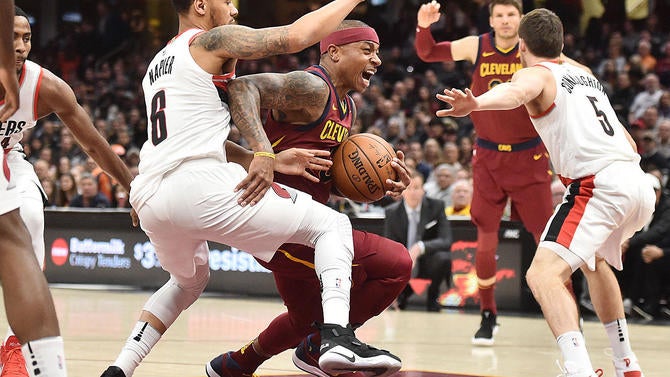
On the night the Celtics made the deal, Danny Ainge, on his conference call with the media, repeatedly said that Kyrie "fit [Boston's] timeline." In other words, he's only 25 years old. His prime is still ahead of him. Like Van Guy said, every team has a different objective, and Boston, especially after Hayward's injury, is looking a few years down the road when young guns Jayson Tatum and Jaylen Brown will have come of age, when the Warriors will have potentially aged back to earth, and perhaps by then LeBron has gone West. If they can contend for a title in the immediacy, which right now it looks like they might be able to, that's a bonus.
Cleveland, meanwhile, has to win now -- which more or less means they have to show strides in trying to gain ground on Golden State -- to have any chance of convincing LeBron to stay this summer, and you can argue they've done that with a potentially more versatile defensive team with Crowder on board (even though they've been pretty awful on that end so far) and Isaiah eventually accounting for much of Kyrie's lost production. And as a safety net, they also get Brooklyn's draft pick to build toward a post-LeBron future should the King leave.
Another win-win.
Chris Paul to Houston
So we don't even need to address the Paul-to-Houston part of this, which has obviously been a monster win for the Rockets, who are the only team in the league that can play a Hall of Fame point guard for all 48 minutes and look like every bit the legit title contender they set out to become in making this trade.
But quietly, the Clippers appear to have made out pretty well in this deal, too. Without Paul, they had no illusions of being a true title contender, but when they re-signed Blake Griffin and also brought in Danilo Gallinari, they made it clear they were still playing to win. Through that lens, Lou Williams -- who they got from Houston in addition to Sam Dekker, Patrick Beverley, DeAndre Liggins, Darrun Hilliard, Montrezl Harrell, Kyle Wiltjer, a top-three-protected 2018 first-round pick and $661,000 in cash -- has been a revelation.
It's easy to think of Williams as a sixth-man spark-plug type, but the dude is a top-20 scorer in the league at almost 22 points and five assists a night. He's averaging 30.5 over the Clippers last four, including a 40-point, eight-assist effort in a win over Charlotte on New Year's Eve. Blake Griffin has missed 14 games, and Gallinari only played five games in November and December combined, yet the Clippers are keeping themselves in the hunt for a playoff spot. There is no way that happens without Williams.
De'Angelo Russell to Brooklyn
The Nets and Lakers also made a deal this summer that is looking good on both sides, with Brooklyn sending Brook Lopez to the Lakers in exchange for Russell. Sure, Brooklyn had to eat Timofey Mosgov's money, but it's not often that a team as bad as the Nets can land a No. 2 overall pick just two years into his career. Russell could still end up a star. He was averaging 20.9 points and 5.7 assists a game, at a career-high 46 percent form the field, before he went down with an injury.
Lopez, meanwhile, has been pretty solid in L.A., and more importantly he's on an expiring deal as the Lakers look to clear their books to potentially sign two max free agents next summer. Russell was no longer necessary as the Lakers handed the keys to Lonzo Ball, who is looking better and better every game, and now they have the money to perhaps put a star or two next to him. This was almost a perfect deal for both sides, if such a thing exists.
You can't win 'em all
OK, so it appears Van Gundy was right. The majority of NBA deals work out pretty well for both sides when you factor in the respective agendas. But the key word there is "majority." Something tells me if the Nuggets had it to do all over, they wouldn't trade the rights to Donovan Mitchell, who looks like an absolute superstar in the making, to the Jazz in exchange for Trey Lyles and the No. 24 pick, which became Tyler Lydon, who's played exactly two total minutes for Denver this season.
We don't need any more time to evaluate that one.
It was a bust for Denver.
It's also looking like the same can be said for the Chicago Bulls' decision to trade No. 38 overall pick Jordan Bell to the Warriors for $3.5 million in cash. Golden State can't keep Bell off the floor. Imagine that Bulls team that is suddenly looking so promising with Bell on board. That was a bad call. But hey, you can't win 'em all.


